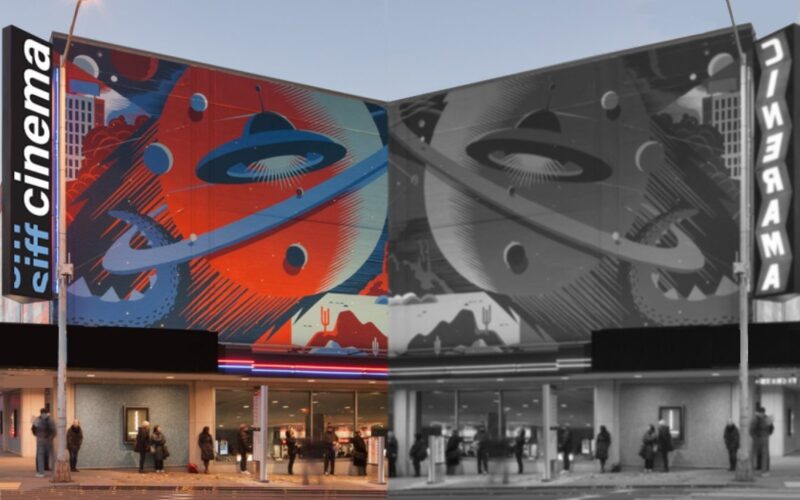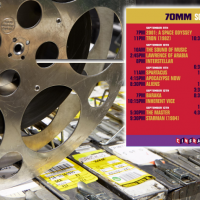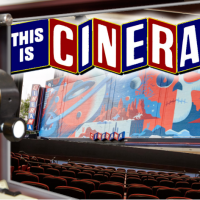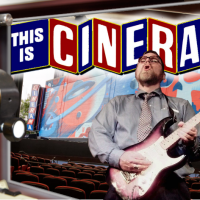
In June 2023, the Seattle International Film Festival — AKA SIFF — announced it acquired ownership of the Seattle Cinerama Theater. SIFF began in 1976 as an actual film festival, and while that still occurs annually, it eventually expanded to operate three theaters year-round, now four with the Cinerama acquisition. These theaters feature both current releases and older films from all around the world.
I covered the Seattle theater’s history in Saving the Seattle Cinerama: Paul Allen’s Gift to Movie Lovers. This was the second of two parts about what had become a Seattle landmark, the first part covering the challenge that theater faced when showing 70mm prints.
The theater was built in 1963 to show movies filmed with the Cinerama process, one of many nationwide where each of three projectors displayed a third of the image onto a giant curved screen to create an immersive experience. The process proved to be so expensive that only two dramatic-narrative feature films and a handful of shorter travelogs were produced, and eventually its theaters converted to a smaller-screened format showing standard releases, with some venues eventually transformed to multiplexes or closing down altogether.
That appeared to be the fate of the Seattle Cinerama in the late 1990s were it not for Microsoft co-founder and philanthropist Paul Allen, who saved the theater from demolition. After going through major reconstructions and upgrades it reopened in 1997 to become the premiere venue for the movie-going experience in the Pacific Northwest. After Paul Allen died in 2018 his company Vulcan continued to operate the theater, announcing that the venue was temporarily closing in February 2020 for “renovations” though what those changes consisted of was never divulged. Its destiny became less certain after the COVID pandemic hit and in May of that year Vulcan announced that the Cinerama would be closed indefinitely. Many feared that for the second time in its existence its days may have been numbered.
The Seattle movie-going community was relieved and cheered when SIFF announced its purchase of the theatre, and many questions about the state of the venue were answered. It would continue to utilize state-of-the-art A/V equipment, feature concessions from local vendors, continue to sell the popular chocolate popcorn, retain reserved seating, and have historic movie and TV costumes displayed through an arrangement with the Museum of Pop Culture (which was launched by Allen).
But there was one point of contention: it was also revealed that the venue would be changing its name—the Cinerama name was licensed to Allen with the stipulation that the name could not be transferred to the new owners. Eventually the theatre settled on calling it the SIFF Cinema Downtown. This led to unanswered questions including why the name couldn’t be relicensed, and how it impacted the future of possible festivals using the three-projector Cinerama process.
The former was of huge interest to folks who had frequented the Seattle Cinerama, including myself. Immediately after the announcement I reached out to the SIFF press department via email to understand why new negotiations couldn’t save the historical name. Not receiving any response whatsoever I followed up with numerous inquiries by both email and phone and was never able to reach anyone. I finally spoke to someone at a SIFF box office, who didn’t know why no one responded to me, and assured me he would make sure someone would be in touch soon.
That was in June 2023, and as of January 2024 never received a response. It was then that I made a final attempt, expressing that the lack of transparency seemed to indicate that perhaps there could be more to this than SIFF staff cared to divulge. To my surprise, I immediately received a response from Madison Zimmerman, whose title is Associate Director PR and Communications at SIFF. Zimmerman profusely apologized, stating that for some reason my communiques weren’t being delivered to the primary inbox. Since I had not seen any answers to the questions I had been pursuing I was happy to accept her invitation to finally discover what a great number of Seattle Cinerama fans were just as eager to learn.
The big question for Zimmerman was why couldn’t the Cinerama name be relicensed? Did anyone reach out to the company that owned the Cinerama name to try to renegotiate a new contract?
“Oh yes, yes, extensively and over many months,” she emphatically stated. “We tried to reach out to see if we could relicense the name. SIFF is foremost a huge fan of this space, and we wanted to keep it as close to its condition as possible, including the name and the branding, and our executive director was reaching out to Decurion, the company that owns the Cinerama name, to try to relicense the name. We were told by Vulcan when we started engaging in initial conversations about acquiring the space that they expected that this would be the case because when Paul Allen licensed the name, Vulcan was actually told directly that if they were ever to sell the space the name would not be relicensed.
“This is something that the original owner of the name has been fairly insistent on since even before SIFF was a twinkle in this theater’s eye. So we definitely tried to pull all of our resources together to try to get the name, but unfortunately, we were not able to.”
As SIFF is a nonprofit organization, I had to wonder if perhaps what might have played into Decurion’s decision could be that the cost of relicensing the name would have been prohibitive for SIFF. Zimmerman quelled that suggestion. “Nope, it had nothing to do with finances, nothing to do with any financial negotiation. Even if a different entity had acquired the space that not been a nonprofit and acquired it for its full worth the name would have not been available for sale…there really was no movement or flexibility on the name.”
Zimmerman went on to say she wasn’t entirely sure of their reasoning but surmised that the rationalization might have to do with what was happening to the venerable Cinerama Dome in Hollywood, which has been closed for quite some time. Beyond that Zimmerman stated, “It seems like there’s not a lot of interest at Seattle branding our location in that way…SIFF was disappointed but understood that it was ultimately [Decurion’s] decision.”
(If this article from 2021 is any indication the future of the Cinerama name, along with Pacific Theaters and Arclight Theaters which are also owned by Decurion Corporation, appears to be very much in doubt. Since that is outside of the scope of the story of SIFF acquiring the Seattle property I chose to not pursue it any further.)
With the story behind the name resolved a related question had to do with the Cinerama process. What could Zimmerman divulge for the future of any festivals at the theater to feature that? “The projecting equipment is also on-site, it’s also in good shape, [and] we plan on utilizing it. As you know based on the article you wrote the three-strip projection is quite the process. That includes shutting down the theater for about two weeks to change out the screen because it requires a different screen, but we do still have the screens on site. When the opportunity arises to do something with those projectors we certainly plan to [use them].”
In short, there will be no issues in advertising use of the Cinerama process. “Correct. The way that form of copyright law works is what SIFF is not able to use is the Cinerama name or the branding, their copyright does not apply to the technology [which] is part of the acquisition of the space. We are welcome to use that at our leisure when we have the opportunity to. Of course, again it’s quite the process, and the [number] of films as you well know that are available in the Cinerama format is quite limited. We have those prints on site and when we have the opportunity again to close the space and prepare for something like that we certainly plan to. But the technology that falls under Cinerama is not part of the copyright.”
But what about another popular festival that regularly occurred back in the Paul Allen years? “The same thing with the 70mm projectors that we also still have on-site, we plan on utilizing those as well…we certainly plan on bringing back the 70mm film festival. The scope of that festival and that date are to be announced. But it is something that is of much interest again. SIFF, really first and foremost, the bulk of us are huge fans of the space and have attended these festivals for many years and are very excited to program that and bring it back under SIFF’s leadership. So that is certainly on the agenda quite soon.”
As I discovered in my article about the theater securing 70mm prints there were occasions where the prints were in terrible condition. In those instances, the theater had requested new prints for their festivals. According to Zimmerman that could still happen. “SIFF works with studios on a daily basis. As you know, we own three other venues which are first and second-run venues, and we have a close working relationship with buyers and distributors, so if there are ever any sort of need SIFF has just as much flexibility and strong partnership with studios for those asks as well if needed.”
What about the various other festivals that folks came to expect from the former Cinerama, including for science fiction films? “There are actually two festivals: there is a science fiction festival, and a science fiction and short films festival that SIFF actually programs in partnership with MoPOP. At our spaces we do a lot of mini-festivals; for example we have our annual Noir City festival; we do doc fests every year at the Uptown; we do Cinema Italian Style. So SIFF has a wide range of festivals that we program on an annual basis.
“Again, we’re huge fans of what the Cinerama did in this space, and we plan on bringing those back, and under SIFF leadership introduce new festivals, or have SIFF festivals we’ve done at other SIFF venues now at this location. We basically plan on fully utilizing this space to its potential and will be a venue at our upcoming 50th annual Seattle International Film Festival in May. The planning and the dates of the festivals will be something that we will fall into a rhythm with in the coming years: introducing new ones, talking with audiences to see what people want to see.”
For the record Zimmerman indicated there were no renovations before the SIFF reopened the Cinerama under its new name. As mentioned earlier, whatever Vulcan was planning when it first announced the closure in February 2020 was never disclosed, but that point is now moot.
For the second time in its storied history this iconic theater had thwarted the wrecking ball, a fate that befell other Cinerama theaters across the country. Seattle is fortunate that Paul Allen’s success in saving this theater will now allow it to continue to thrive—and even grow–under SIFF leadership.
May the Seattle Cinerama rest in peace. Long live the SIFF Cinema Downtown.
Special thanks to Madison Zimmerman and SIFF.
© 2024 Mike Tiano. All Rights Reserved
- Steve McKnight and GayC/DC: Breaking the Rainbow Ceiling - April 22, 2024
- How the Seattle Cinerama Was Reborn as SIFF Cinema Downtown - April 12, 2024
- Why the Beatles Were the First Global Cultural Phenomenon - February 16, 2024




